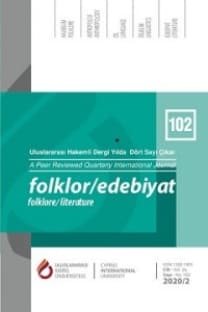Java Kültürü’nden gelen Jaka Tingkir Folkloru’nda Kahramanlığın Değeri
Jaka Tingkir folkloru, Endonezya Merkez Java’da bulunan Sragen’deki popüler bir kültür biçimidir. Bu folklorik veriler, Demak Krallığı’nda Jaka Tingkir’in kendisini Pajang askerlerinin liderine ve Pajang Krallığı’ na adadığı zamanlarda, Tingkir’in Sultan Hadiwijaya ismini alıp kral olmasıyla ortaya çıkmıştır. UNESCO bu önem ve özgünlüğü nedeniyle kültür formunu Endonezya’ya ait olarak kabul etmiştir. Böylelikle günlük hayatta bu folklor türünden toplumdaki karakter yapısını biçimlendirmek üzere faydalanmak mümkün olacaktır. Kahramansal değerler, Jaka Tingkir Folklor’unun ana karakteri olan Jaka Tingkir’e odaklıdır. Bu araştırma çalışması Endonezya, Merkez Java’da Butuh, Gedongan, Plupuh ve Sragen’de gerçekleştirilmiştir. Çalışma, folklor yaklaşımlı bir kültürel araştırmadır. Araştırma iki veri kaynağından oluşmaktadır. Muhammad Aziz, Suparno, Andun Jailani ve Iswahyudi, sözlü verilerden meydana gelen birincil kaynağı sağlamışlardır. İkincil ve yazılı kaynağı oluşturanlar ise Merkez Java, Jaka Tingkir Halk Hikâyesi Kitabı: Vahiy Dolambaçlı Yollardan Gelir ve Babad Demak 2’dir. Örnek seçimi için amaçsal örnekleme metodu kullanılmışır. Bu çalışmadaki veri toplama yöntemi, sözlü verilerden gelen öykü mülakatlarının sonuç raporlarından ve yazılı veri için gerçekleştirilen edebî çalışmalardan faydalanmaya dayalıdır. Toplanan bu verinin geçerliliği için kaynak üçgenlemesi kullanılmaktadır. Bu çalışmadaki veri analizi metodları fonksiyonel analiz ve döküman analizlerinden oluşmaktadır. Bu çalışmanın sonuçları, Jaka Tingkir folklorundaki iyi ahlak, fedakârlık için duyulan istek, ülkeyi savunma, disiplin, asla pes etmeme, cesur, dürüst, sorumluluk sahibi, özgüvenli olma ve liderlik olarak bilinen kahramanlık değerleridir. İnsanlar ve hayvanlar bu değerleri hayatlarında uygulayabilirler. Bahsi geçen bu değerler, bir ya da birden çok insana hitap edilebilir. Bu kahramansal değerler hakkında incelemeler yapılmasının sebebi, bahsi geçen bu değerlerin, topluma karakter oluşturma açısından sağlayacağı faydaların varlığıdır.
Anahtar Kelimeler:
Jaka Tingkir, Java Kültürü, Endonezya, kahramanlık değerleri
Heroic Values in Jaka Tingkir Folklore from Javanese Culture
The folklore “Jaka Tingkir” is a form of Javanese culture and literature which is popular in Sragen, Jawa Tengah, Indonesia. The story takes place in the Kingdom of Demak (when Jaka Tingkir devoted himself as leader of the soldiers), as well as in the Kingdom of Pajang (when Jaka Tingkir becomes the king with “Sultan Hadiwijaya” title). UNESCO has recognized this folklore as ‘Indonesian culture’ and stated that it has a good value, therefore people can use it as a way to build (improve) their characters in daily life. This research aims to describe the ‘values of heroism’ in this particular folklore. The heroic values are emphasized in the main character; Jaka Tingkir. This research was conducted in Butuh, Desa Gedongan, Kecamatan Plupuh, Kabupaten Sragen, Jawa Tengah, Indonesia. This is a cultural qualitative research with a folklore approach and consists of two data sources. The sources of the verbal data as well as the primary data are from four people; namely Muhammad Aziz, Suparno, Andun Jailani and Iswahyudi - while the sources of the written data as well as the secondary data are Buku Cerita Rakyat Jawa Tengah Jaka, novel epik Jaka Tingkir: Jalan Berliku Menjemput Wahyu, and Babad Demak 2. The researcher used purposive sampling for the sample selection. Meanwhile, the data were collected through narrative interviews (for the verbal data) and literature study (for the written data). The validity of the data in this research is processed with source triangulation, while the data analysis method is functional and document analysis. The results of this research suggest that the values of heroism in the folklore “Jaka Tingkir” are good morals, the willingness to sacrifice, loyal to the country (willing to defend it), discipline, relentless, brave, honest, responsible, confident and great leadership skills. Living creatures, such as humans (both male and female) or animals can imply these values in life, which can be addressed to an individual or many people. The reason these particular values were examined is because they can be useful as a way to build and improve one’s character, especially in today’s society
Keywords:
Jaka Tingkir, Javanese culture, Indenosia,
___
- Allison, S. T., Goethals, G. R., & Kramer, R. (2017). The handbook of heroism and heroic leadership. Routledge. Amri, Y. K., Putri, D. M., & Saputra, B. P. (2022). Form of mandate as a message in folklore. Matondang Journal, 1 (1), 32–40. https://doi.org/10.33258/matondang.v1i1.582
- Asika, I. E. (2020). Resurrecting igbo cultural values through folklore: ‘Egwu Onwa’ and its commitment towards societal ethos. Nigerian Journal of African Studies, 2 (2), 1–14. https://www. nigerianjournalsonline.com/index.php/NJAS/article/view/1332
- Baan, A. (2021). Folklore in literature learning as a model for developing cultural characters and student’s personality. ISLLAC, 5 (1), 83–93. http://journal2.um.ac.id/index.php/jisllac/article/ view/19073
- Balthazar, C. H., & Vendrely, A. M. (2022). Rehabilitation research: Principles and applications. Elsevier.
- Beggan, J. K. (2019). On the downside of heroism: Grey zone limitations on the value of social and physical risk heroism. Heroism Science: An Interdisciplinary Journal, 4 (2), 1–35. https://doi. org/10.26736/hs.2019.02.05
- Bertrand, R. (2015). Locating the ‘family-state’: The forgotten legacy of Javanese theories of the public domain (17th-20thc.). Patrimonial Capitalism and Empire, 28, 241–265. https://doi.org/10.1108/ S0198-871920150000028010
- Bronner, S. J. (2019). The Oxford handbook of American folklore and folklife studies. Oxford University Press. https://doi.org/10.1093/oxfordhb/9780190840617.001.0001.
- Brown, J. W. (2021). The security leader’s communication playbook: Bridging the gap between security and the business. CRC Press.
- ISSN: 1300-7491
- Başlangıç: 1994
- Yayıncı: -
Sayıdaki Diğer Makaleler
Nazlı Eray’ın Kayıp Gölgeler Kenti ile Philip Kerr’in Ölümcül Prag Eserlerindeki Prag Görünümleri
Halkbilimi Kuramları Bağlamında KKTC-Gelincik (Vasili) Köyü’nün Tarihi Üzerine Yeni Bilgiler
Woolf’un Kendine Ait Bir Oda’sındaki Kadın Temsilleri
Nurdan ATAMTÜRK, Çelen DİMİLİLER
Akçakoca Destinasyonu’nun Tarihî İnsan Ekolojisi; Karadenizin Kıyıcığında Romanı
Hekim Edebiyatçılar ve Hekim Adaylarının Edebiyata İlişkin Metaforik Algıları
Sözsüz Folklor ve İşlevleri Bağlamında Restoran Kültürü
Beden İşaretleri: Dövme Popüler Bir Kültür Ürünü müdür?
Endonezya Mitolojisi Üzerinde Etnografik Bir Çalışma: Tempuutn Langit Tana Efsanesinin Yapısı
Nina Queena Hadi PUTRİ, Andayani ANDAYANİ, Nugraheni Eko WARDANİ
